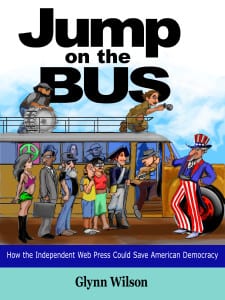By David Underhill –
The American South is conservative. This is repeated so often that it resembles church liturgy uttered without thought to display adherence to a creed. But it won’t bear examination.
The civil rights movement sprang from the South and convulsed the whole country, which quivers still from the effects in this presidential election year a half century later. And that movement arose especially from Alabama. And from it came in direct line of succession – by organizations, individuals, ideas and attitudes – the Vietnam anti-war agitation, hippies and the 60s, women’s liberation and feminism, and the environmental movement.
So it’s fitting that conservative Alabama should have given rise to a startling new departure in American journalism. The press whose freedom was written into the constitution meant literally inked type pressed repeatedly against paper to produce mass circulation news. The constitution contains several clauses pertaining to generally commerce, contracts, coinage and currency. But only one business has a specified, protected role in government: the press.
It was assigned the duty and responsibility of functioning as the public’s eyes keeping watch over governmental operations and reporting its findings to the citizens so they could exercise democratic control of this civic servant with the power to become monstrous if not closely supervised. For two centuries the printed paper press did this, with varied skill and integrity.
But late in the 20th century a fledgling technological change began to alter the role of the press. Even this name became an anachronism when news started arriving as internet transmissions on screens rather than ink pressed onto paper. Most newspapers failed to recognize and adapt to this change until years after it was underway. And even upon recognition, most newspapers fitfully added digital versions as mere appendages to their print editions.
Glynn Wilson is one of the few visionaries who did otherwise. He launched what looked like a promising standard career as a reporter on small town Alabama newspapers. But he combined this with academic and big city forays which exposed him to the budding developments that would grow into the current profusion of online news and instant mass networked media.
By some prophetic epiphany, deep in the conservative South in the 1990s, Wilson realized that the future of the news inhered in digital blips. And he set out to create an online newspaper. Not an appendage to a print edition, not a mere aggregation of news items from other sources, not casual airy blogging. But an actual fully fledged newspaper wholly online with its own straight reporting, plus investigative pieces, plus features, plus photography, plus arts, plus everything else print papers had traditionally done. He would begin locally but aimed for an eventual national span.
This, thought Wilson, is how the press would carry out its constitutionally assigned task in a digital computerized era. And it would have to be paired to a business plan making it commercially viable for a sustained, vigorous existence.
Jump On the Bus is Wilson’s account of how he has accomplished this – so far. It’s an unfinished story of a continuing journey along a twisty, roller-coasterish road. Perhaps the trip will arrive at its envisioned destination. Or it could go astray. Even crash.
Tesla never got to the places where he imagined he was he was headed. But his name has far outlived his passage through this world.
—
David Underhill is the Associate Editor of the New American Journal. He has written about politics and the environment for many years, publishing articles with Counter Punch, The Locust Fork News-Journal, The Harbinger and other publications. He is now Conservation Chair of the Mobile Bay Sierra Club and engaged in shining the spotlight on the problems of tar sands crude coming to the Gulf Coast by rail in the wake of the BP oil spill and other environmental problems, including oil and gas drilling leases in the Gulf of Mexico.
—
Glynn Wilson, author of Jump On The Bus and editor and publisher of the independent New American Journal, is a veteran newspaper reporter, magazine writer and editorial columnist with more than three decades of experience covering public affairs and science for traditional news outlets such as The Nation, The New York Times, The Christian Science Monitor, The Dallas Morning News and UPI.
Jump On The Bus, a parable and a syllogism, is the story of Glynn Wilson’s life as a writer. It is a memoir, but an important theme runs throughout. If you consider democracy to be an ideal form of government and society worth fighting for, then this offers up a critical element needed to keep the idea going. While the economies for the news business, books, music and independent films are stuck in the abyss, according to Joseph Campbell’s monomyth of the hero’s journey, this is the story of Wilson’s adventures in American journalism and offers an elixir from this reporter’s experiences to raise the level of dialogue in the United States. His story shows how an alternative, independent, watchdog press is critical to making democracy work, but makes the argument that it has to be adequately funded. It is also an inspirational story for anyone interested in knowing how to succeed in writing, film, music – or in life.
Click here to order the Ebook on Kindle or order the paperback edition in print














